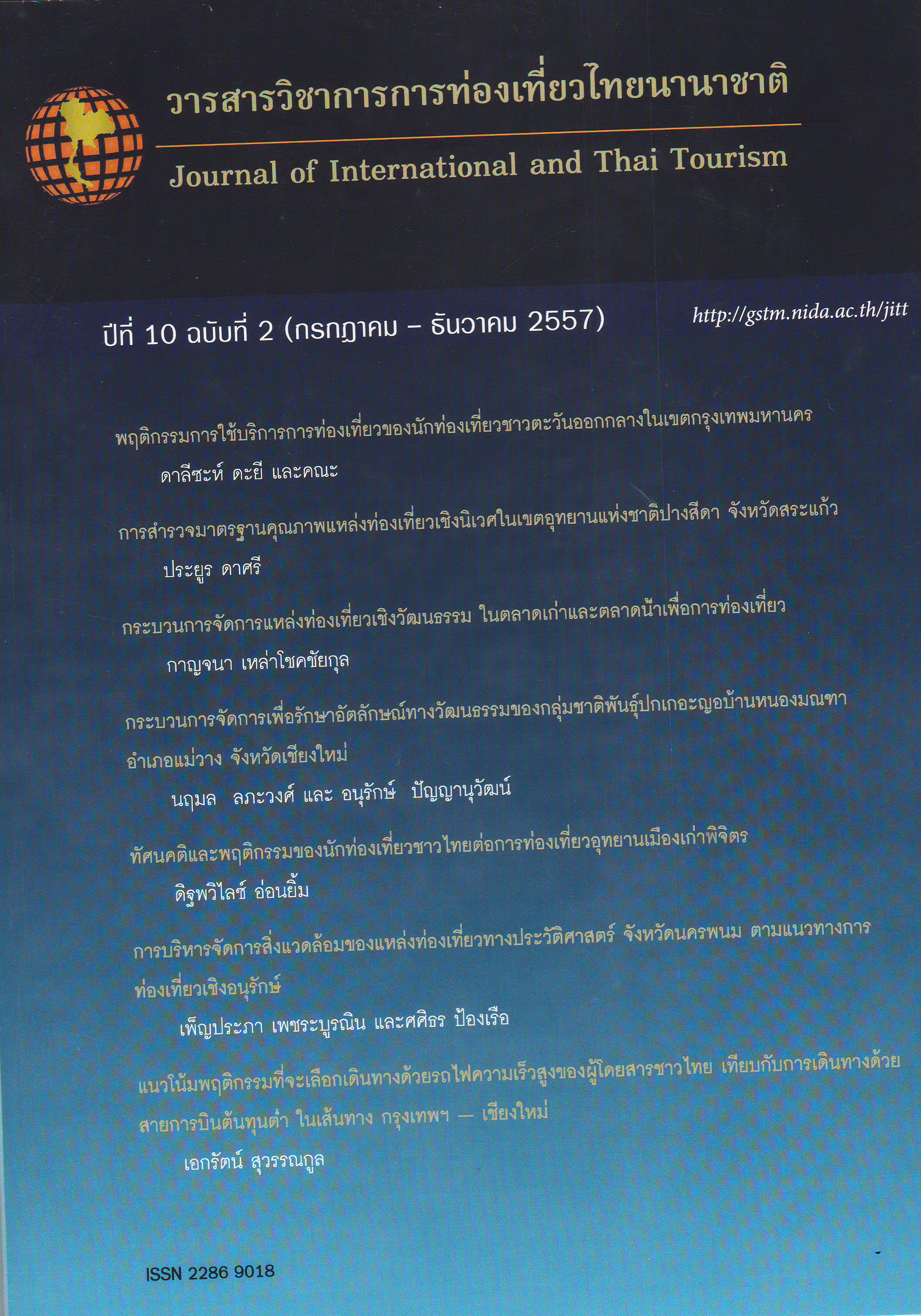การส ารวจมาตรฐานคุณภาพแหล่งท่องเที่ยวเชิงนิเวศในเขตอุทยานแห่งชาติ ปางสีดา จังหวัดสระแก้ว
Main Article Content
บทคัดย่อ
บทคัดย่อ
การวิจัยนี้เป็นการวิจัยเชิงส ารวจและเชิงคุณภาพ เพื่อศึกษาค่ามาตรฐานคุณภาพแหล่ง
ท่องเที่ยวเชิงนิเวศในเขตอุทยานแห่งชาติปางสีดา และน าผลจากการวิจัยไปบูรณาการจัดการการ
ท่องเที่ยว วัตถุประสงค์ส าคัญของการวิจัยมีดังนี้คือ 1) เพื่อประเมินมาตรฐานคุณภาพแหล่งท่องเที่ยว
เชิงนิเวศ 2) เพื่อศึกษาศักยภาพของ 4 องค์ประกอบหลักของแหล่งท่องเที่ยวเชิงนิเวศ 3) เพื่อศึกษาค่า
ความเชื่อมั่นของแบบประเมินมาตรฐานคุณภาพแหล่งท่องเที่ยวเชิงนิเวศ 4) เพื่อให้ได้ข้อมูลพื้นฐานใน
การน าไปประยุกต์ใช้เพื่อการจัดการการท่องเที่ยวเชิงนิเวศในเขตอุทยานแห่งชาติปางสีดา กลุ่มตัวอย่าง
ที่ใช้ในการวิจัยมีจ านวน 5 กลุ่มๆ ละ 30 คน ข้อมูลที่ใช้ในการวิจัยได้จากการตอบค าถามของกลุ่ม
ตัวอย่าง สถิติที่ใช้ในการวิเคราะห์ข้อมูลเป็นสถิติเชิงพรรณนา ได้แก่ ค่าเฉลี่ยและค่าร้อยละ สถิติ
วิเคราะห์หาค่าความเชื่อมั่นของแบบประเมินใช้สถิติหาค่าแอลฟ่า ( -Coefficient) สัมประสิทธิ์แอลฟ่า
ของครอนบาค (Cronbach Alpha Coefficient) ผลจากการวิจัยพบว่ามาตรฐานคุณภาพแหล่ง
ท่องเที่ยวเชิงนิเวศในเขตอุทยานแห่งชาติปางสีดา โดยรวมทั้ง 4 องค์ประกอบหลัก มีคะแนนเฉลี่ยที่ 66
คะแนน เป็นคะแนนมาตรฐานคุณภาพแหล่งท่องเที่ยวเชิงนิเวศอยู่ในระดับดี หรือระดับ 3 ดาว (***) ค่า
ความเชื่อมั่นหรือค่าสัมประสิทธิ์แอลฟ่าของแบบประเมิน มีค่า 0.7380 และมีค่าสหสัมพันธ์ของคะแนน
ทั้ง 5 กลุ่มมีนับส าคัญทางสถิติที่ระดับ 0.01 และ 0.05 ถึง 40 คู่ หรือร้อยละ 20.41 ผลจากการวิจัยนี้
ขอเสนอเป็นข้อมูลเพื่อน าไปประยุกต์ใช้ในการจัดการการท่องเที่ยวเชิงนิเวศในเขตอุทยานแห่งชาติปางสี
ดา ดังนี้ 1) การจัดการการท่องเที่ยว ควรค านึงถึงมาตรฐานคุณภาพแหล่งท่องเที่ยวต่อการรองรับ
นักท่องเที่ยว 2) การจัดกิจกรรมการท่องเที่ยว ควรให้ชุมชนทุกภาคส่วนเข้ามามีส่วนร่วม 3) การจัดการ
การท่องเที่ยว ต้องค านึงถึงความยั่งยืนของแหล่งท่องเที่ยวทั้งทางธรรมชาติและวัฒนธรรม 4) การ
ประเทศไทยเองควรส่งเสริมเรื่องฮาลาลเพื่อการท่องเที่ยว เพื่อเป็นการดึงดูดให้นักท่องเที่ยวชาว
ตะวันออกกลางและนักท่องเที่ยวทั่วโลกเดินทางเข้ามาท่องเที่ยวในประเทศไทยเพิ่มขึ้น พ านักใน
ประเทศไทยนานขึ้นและเพื่อให้ประเทศไทยเป็นจุดหมายปลายทางส าหรับนักท่องเที่ยวชาวตะวันออก
กลางและนักท่องเที่ยวมุสลิมทั่วโลกในที่สุด จัดการการท่องเที่ยวเชิงนิเวศในเขตอุทยานแห่งชาติปางสี
ดา ต้องค านึงถึงความเป็นมรดกโลกของอุทยานแห่งชาติปางสีดา
Abstract
This study is a qualitative research to examine the means to manage
ecotourism in Pang Sida National Park. The results of the research are applied to
ecotourism management. The key objectives of the research are as follows: 1) to
assess the standard of ecotourism destination, 2) to examine 4 main quality elements
of ecotourism destination, 3) to examine the reliability of the assessment on the
quality of ecotourism destination, 4) to obtain the Pearson correlation value from the
assessment, and 5) to obtain the management guidelines on ecotourism in Pang Sida
Samples in the research are from different careers and educational
backgrounds. The total 150 samples are divided into five groups of 30 people. The
data used in this research are the answers from the questionnaires on the quality of
ecotourism destination. The statistic values used in the analysis are descriptive
statistics such as average and percentage. The statistical analysis of the reliability or
coefficient alpha (α-Coefficient) for the assessment was Conbach Alpha Coefficient.
The study also uses Pearson's correlation coefficient to examine the relation between
the scores of two independent groups.
The results of the study reveal that the quality standard of eco-tourism
destination in Pang Sida National Park is made up of four key components. An average
of 66 points is a quality score in ecotourism destination, representing the good level
with 3 star (***). The results also reveal the value of Coefficient Alpha at 0.7380 and
the Pearson correlation coefficient scores from the assessment with significance at 0.05
and 0.01, 40 pairs from the total of 196 pairs.
The results of this research introduce the means of integrated management on
ecotourism in Pang Sida National Park as follows: 1) ecotourism management should
include the quality standard of accommodation; 2) ecotourism activities need
collaboration from all sectors in the community; 3) ecotourism requires sustainability
in natural and cultural prospects; and 4) the management of ecotourism in Pang Sida
National Park should be taken into account as the World Heritage Pang Sida National
Park.


